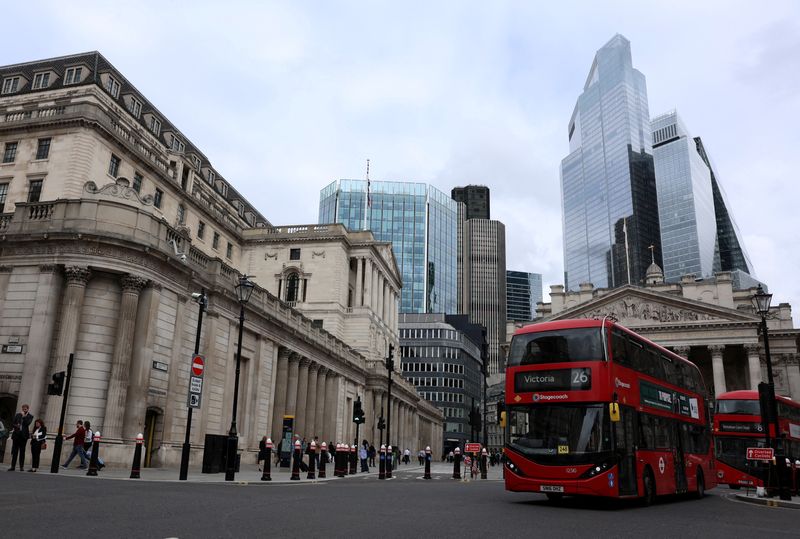By Mike Dolan
LONDON (Reuters) – Britain’s pivotal tax, borrow and invest budget has elevated the Bank of England’s interest rate horizon but sterling has hesitated and reversed – suggesting some think the BOE may well take a more nuanced view over the coming year.
BOE officials are currently in their traditional blackout period ahead of next Thursday’s interest rate decision, so the central bank has had no immediate reaction to this week’s budget.
But markets have already tweaked their forecasts after reading the runes of the UK fiscal plans and revised forecasts from the independent Office for Budget Responsibility, which show higher growth and inflation next year.
Not only are markets now pricing in at least one fewer UK rate cut next year than they had been, but they’ve even injected some doubt about whether there will be any easing next week.
Up until Wednesday, money markets appeared confident that the BOE would announce their second 25 basis point cut of the year next week, reducing the policy rate to 4.75%. The chances of this happening have since fallen to just 80%. And Goldman Sachs has broken with the pack and is now forecasting that the Bank will stay on hold at Thursday’s meeting.
Moreover, implied market rates for the end of 2025 have risen to more than 4%. That’s now half a point higher than the Fed equivalent in a year’s time even though the two are little more than 10bps apart right now.
Five-year gilt yields are also higher than those of U.S. Treasuries – despite sharp pre-election increases stateside. And five-year gilts are some two percentage points above the German benchmarks.
The 18bps rise in two-year yields on Thursday was the largest one-day move since February.
Though this may reasonably show markets bracing for heavy new UK borrowing ahead, the market rush to revamp the BOE rate outlook looks less obvious.
While it’s hard to read too much into global bond market moves mere days ahead of a potentially seismic U.S. presidential election, the pound’s dour reaction to this week’s big shifts in UK fiscal policy is notable.
Sterling barely moved on budget day and has actually started to weaken against both the dollar and euro since then. This reflects either the re-emergence of a UK risk premium or contains doubts about whether the BOE will actually follow through on the markets’ more hawkish rate projections.
RISK OR RETHINK
The arguments for a more hawkish BOE centre on the injection of new stimulus into the economy and higher inflation forecasts. The latter are fuelled by parallel hikes to the UK minimum wage and the risk that employers bearing the brunt of the new tax rises may try to recoup lost earnings with price rises.
With the BOE still wary of brisk wage and services price growth even as headline inflation has returned to target, many now feel that governor Andrew Bailey’s recent suggestion for more “activist” monetary easing may need to be put on ice.
But there’s good reason for the BOE to stick to its course.
The new OBR inflation forecast of 2.6% for next year is only one or two tenths higher than the BOE’s standing forecast from its August Monetary Policy Report, which will be updated next week.
And the Bank may also be taking a longer-term view of the potential impact of the budget measures, which could prevent them from over-reacting.
In its review of the budget, the independent think tank National Institute of Economic and Social Research (NIESR) said the payroll tax increase on employers will hit job creation over time and likely cause the unemployment rate to rise.
“We expect significant negative impacts on employment and wage growth, especially in low-paid sectors such as hospitality,” it said of the combined tax and minimum wage rises.
While the OBR forecasts that the UK will enjoy a real GDP growth bump to 2.0% next year, it expects this to fade thereafter, returning to 1.8% in 2026 and back to 1.5% in subsequent years. In such an environment, the government might struggle to fund higher borrowing unless there are deep interest rate cuts.
And even if the government’s borrow-to-invest plan is successful and lifts UK potential growth from the meagre 1.5% now assumed, that should also increase the capacity for the economy to advance longer-term without causing a significant rise in inflation.
Giant global bond investor PIMCO said it continues to favour gilts even after the budget announcement, as it expects macro drivers such as softening inflation to quickly take over from fiscal concerns. “There are no reasons for us to question the fiscal credibility in the UK,” said PIMCO economist Peder Beck-Friis.
A hawkish twist by the BOE may, therefore, not be as obvious as many assume – unless of course the pound does indeed take serious fright and complicates the whole picture even further.
The opinions expressed here are those of the author, a columnist for Reuters
(by Mike Dolan; Editing by Hugh Lawson)



